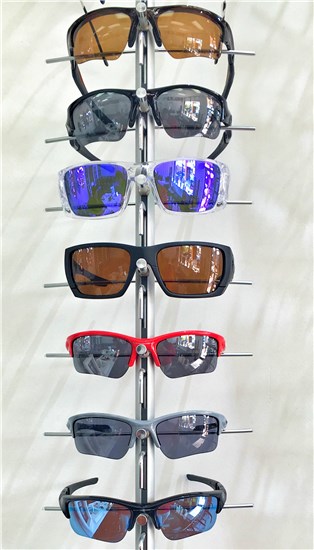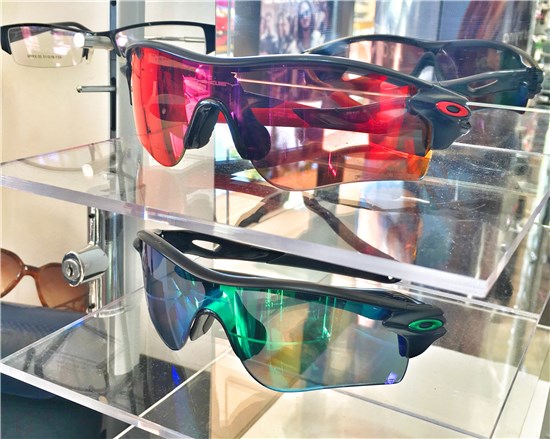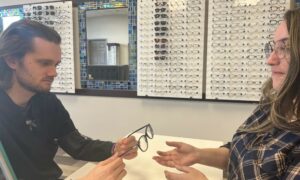By Lina T. Arango, OD
Oct. 5, 2016
Eyewear that suits the needs of sports-active patients is a growing opportunity. I know this both as an OD, and as an athlete myself. As a triathlete, I am active in the sports community of Miami, where I practice. This is an area in which an outdoors lifestyle is the norm, with many of my patients participating in everything from marathons and triathlons to boating. Providing the right sports eyewear to my patients is importantbecause I share a love of athletics with these patients, and because many athletes still don’t understand the benefits of eyewear tailored especially for their sport, and the importance of protecting their eyes from the sun.
Invest in Products & Display Prominently
My practice sells Oakley and Ray-Ban sports sunwear, but we are planning to expand the selection of sports sunglasses to include: more Oakley styles, especially the Jawbreakers; EVZero; Smith Optics; Rudy Project; and POC.
I will designate a portion of one of the main walls for sports eyewear, each brand will have its display, and we will have sports-related art and wall decor. The main focus of the practice will still be ophthalmic eyewear, however. The idea won’t be to completely shift the practice toward a sport-centric environment, but to make sports eyewear a prominent part of the practice.

Sports sunwear on display in Dr. Arango’s office. It is essential to stress that while such sunwear has a stylish look, it’s about more than fashion. It’s about protecting your eyes from harmful ultra-violet radiation. It also helps to point out the performance-enhancing potential of the right eyewear.
Educate on Benefits to Both Eye Health & Fashion
I want to achieve profitability in the sports eyewear we sell, but my main goal is to create vision health awareness. Athletes need to understand that our eyes are affected by many different factors when training and racing. Sports sunwear offers patients a “cool” look that matches outfits, but much more importantly, it protects their eyes from the harmful effects of the sun, and can improve sports performance.
I want to educate patients about sports sunwear as part of my overall effort to promote eyecare, UV protection, safety lenses and yearly eye exams.
That said, there is an opportunity for practices to expand revenues by selling sports eyewear. A cyclist, or triathlete, like myself, owns at least three pairs of sports sunglasses. Every six months there is a need for a new pair due to overuse of current ones, or just because there is a new color lens in the market, and it will match with the cycling kit.
Plano sports sunglasses cost price varies from $50-$100 approximately, with a retail cost of $120 and up.
My projection is to invest around $5,000 in sports eyewear products for my optical, and to experience a profit of double that investment, or more.
The reasoning behind the $5,000 investment in sports eyewear is that I want to introduce to my practice three brands to start with, with each brand requiring about a $1,500 initial (minimum) investment to be able to have their products in my practice.
Ask About Sports on Intake Form & Ask Again in Exam Room
There is an area on our patient intake form that asks about occupation and hobbies. However, not many people answer it. For that reason I always ask those same questions, about each patient’s lifestyle needs, during my case history in the exam room. It is crucial to understand the patient’s visual needs to be able to recommend the right lenses and treatments for them.
In addition to general lifestyle questions, I am planning to include a section on our intake form just for sports-related questions.
I feel it is important that the doctor herself ask the patient about lifestyle- and sports-related activities. Rather than have a support staff member asking the patient these questions, and just passing along the responses to me, I prefer to talk about sports-related needs during the eye exam, so I can start connecting better with each patient, and building a relationship with each.
Craft Your Questions & Recommendations
Think carefully about the questions you feel would most likely give you the information you need to make the best recommendations to the patient.Here are the key questions I ask every patient:
“Do you practice any sport?” If yes, then “Which one(s)?”Based on this answer I will recommend the type and style of the frames, type of lenses needed including polarization, lens color, or any other specific lens such as PRIZM lens from Oakley for road cyclist.
“Do you practice multiple sports? Or do triathlons?” If the answers is “yes,” my follow-up question is: “Do you like to use your sports watch and bicycle computer while training/racing at all times?” If yes: “I do triathlons myself, and polarized lenses are not my top choice because they will distort the images from these devices. Instead, I recommend the PRIZM road technology from Oakley. I own a pair myself and I love them!”
“Are you in the sun for long periods of time when training?” If the patient answers yes,I say: “Then polarized lenses are highly recommended.”
“Do you prefer to train really early in the morning or late afternoon?” If yes, I would say: “Transitions lenses are recommended.”
“Have you tried contact lenses yet?” If no, and interested in trying them: “Contacts can be the most comfortable and easiest option when playing sports. I would recommend a daily disposable contact lens, so you have fresh, clean lenses each time you get ready to practice, train or compete. You then can wear your UV- performance-enhancing sunwear over your contacts.”

Sports sunwear showcased in Dr. Arango’s office. Sharing your own passion for sports with patients, including the eyewear you use for those sports, can help educate patients about what a pair of advanced sports sunwear can do for them.
Educate on Usefulness of Different Lens Tints
A patient recently complained of glare when golfing. So, I recommended a blue-tinted lens to help increase clarity and enhance the colors of the golf course and ball, and, of course, with a UV protection filter.
It’s hard financially for some patients to have multiple sports glasses, but there are companies like Smith Optics that have styles with interchangeable lenses, which I educate my patients about. I really like this option because you only have to buy replacement lenses and switch them based on the temperature, lighting and other environmental factors.
Share Your Own Sports Eyewear Preferences
I love the sports I do, especially cycling, and many athletes share the same passion, so when in front of a patient who is also engaged in sports I do not hesitate to start talking about my previous experiences and future races. It helps me connect better and gain their confidence in my expertise and eyewear recommendations.
Plus, I am learning from my patients, as well, who will let me know which eyewear they have found most helpful, and which they wouldn’t want to try again. That feedback allows me to better tailor my recommendations for other patients, and to choose better options for myself, too.
Educate Opticians on How Best to Fulfill Sports Eyewear Prescriptions
The best approach is to have the labs you use allow for the specific parameters of the prescription sports lenses you offer. Then, print out those parameters and have them handy for opticians to reference. In addition, have education time with your opticians to make sure everyone is on the same page when sending out sports eyewear prescriptions to the lab.
Let Patients Try Sports Eyewear Themselves
We have an indoor demo for polarized and Transitions lenses, but the best way to educate and persuade a skeptical patient about sports sunwear is to have them try it. Ask the patient to walk outside to see how much more they could be enjoying and excelling at their sport with the right eyewear.
Related ROB Articles
Six Ways to Sell Optical Products that Protect Against Blue Light
Adaptive Lenses: Tips to Increase Capture Rate
Visual Acuity: Should 20/10 Be the New Standard?
Lina T. Arango, OD, is the owner of LTA Vision, an independent practice affiliated with Clinical Care Medical Centers in Miami, Fla. To contact: linatarango@gmail.com

























